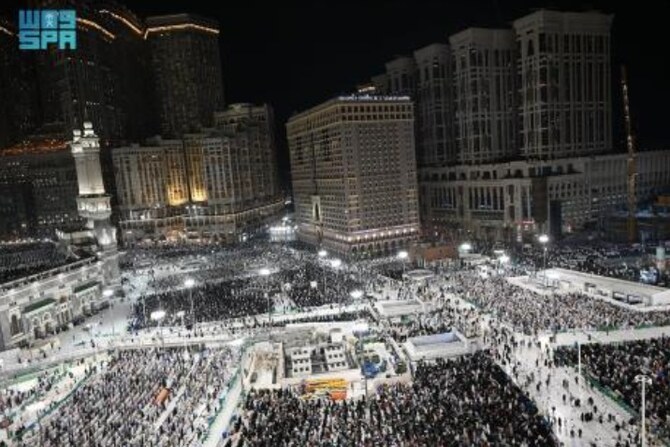RIYADH: Ramadan is a highly popular period to perform the Umrah pilgrimage, and travel agencies and tour operators are cashing in on the festive rush.
Flights from Riyadh to Jeddah are seeing increased demand and surging prices.
“There was an offer on Saudi Founding Day so some people got cheaper tickets, but with the beginning of Ramadan tickets went up,” said Mohammad Aslam Jameel, a travel company supervisor in Riyadh.
“If you are traveling now to Jeddah, the round-trip tickets will cost about SR1,700 ($453) to SR2,000.”
There are comparatively cheaper tickets for odd timings, but they, too, will total about SR1,500 now to SR 2,000 during Qiyam — the last 10 days of Ramadan — he added.
Umrah travel operators in Riyadh have almost doubled the price of the bus tour package to SR200 per person, Mohammed Iqbal, who recently booked an Umrah pilgrimage, told Arab News.
“The huge rush was due to the holy month of Ramadan since most of the people want to spend these days in the holy cities of Makkah and Madinah,” he said.
An employee of Al-Fajr, a tour operator in the city, also added that the increased prices were due to surging demand.
Ticket prices for international flights, too, have soared on dates close to Eid Al-Fitr as many expatriates plan to travel back home.
Asif Ahmed, an Indian working in Riyadh and traveling home for the Eid celebration with his family, told Arab News: “When I had checked the price with the tour operator for the same period two months ago for a round trip, it was about SR2,000. Now the tickets prices for the round trip have soared to SR4,000.”
Syed Faiz Ahmad, a Pakistani expat working in Yanbu, told Arab News: “It’s my 28th year staying in Saudi Arabia. During my early years the cost of air tickets for travel to my native country during Eid was not much, but as the time has passed all airlines have started to raise the prices exorbitantly amid (the) festive rush.
“This has become economically challenging to travel home during holidays especially with family.”
Saudi Arabia’s religious tourism sector is experiencing remarkable growth, with data revealing a sharp rise in travel demand for 2024 and 2025.
Findings from travel booking platform Skyscanner highlight the increasing global interest in pilgrimage travel.
With early 2025 travel data already reflecting strong demand, the trend of growing religious tourism is expected to continue.
January 2025 saw a 21 percent year-on-year increase in flight searches to Saudi Arabia, with peak travel interest centered around March 2025 — coinciding with the start of Ramadan.
Findings for 2024 also revealed spikes around Ramadan (March–April) and Hajj (June).
Madinah has emerged as a key destination for travelers interested in pilgrimage, with searches for flights to Prince Mohammed bin Abdulaziz International Airport rising by 54 percent year-on-year.
Religious tourism remains a cornerstone of Saudi Arabia’s Vision 2030 strategy, serving as a key pillar in the Kingdom’s economic transformation. Significant investments are being made to improve infrastructure, expand flight routes and enhance the pilgrim experience.
Key projects such as the Makkah Route Initiative for Hajj pilgrims and the Haramain High-Speed Railway are instrumental in these efforts.
Countering the trend of surging prices, the railway offered discounts on two-way travel between Makkah and Madinah during the first 20 days of Ramadan.
The railway has also increased Makkah-Madinah trips for the final 10 days of Ramadan to accommodate the surge in Umrah performers during Qiyam Al-Layl, with 130 additional daily trips added, the Saudi Press Agency reported.
The Haramain High-Speed Railway, among the world’s fastest railways with a speed of 300 km per hour, also increased station gate capacity from eight to 24 and added two terminals.


Saudi Arabia sees surging prices for religious tourism amid Ramadan rush
Short Url
https://arab.news/wxn3a
Saudi Arabia sees surging prices for religious tourism amid Ramadan rush

- Umrah package prices soar amid high demand for pilgrimage to holy cities
- Some international fares double amid festive rush of expatriates going home for Eid Al-Fitr
Saudi delegation headed by investment minister arrives in Damascus

DUBAI: A Saudi delegation headed by the kingdom's investment minister arrived in the Syrian capital of Damascus on Saturday, Al Arabiya News Channel reported.
Several announcement are expected today related to the signing of strategic contracts between Saudi companies and the Syrian government, Al Arabiya's correspondent reported.
© 2026 SAUDI RESEARCH & PUBLISHING COMPANY, All Rights Reserved And subject to Terms of Use Agreement.















